Working on research projects gives students the opportunity to apply what they learn in their coursework to real-world contexts, and sharing what they learn with others enables students to reflect on and articulate their achievements—two of the cornerstones of integrative learning. Each spring the Office of Undergraduate Research hosts UCF’s Showcase of Undergraduate Research (SURE), which brings together hundreds of students who present their research and creative work.
This year’s showcase, the thirteenth such event, featured 436 students, from 58 different majors, presenting 342 posters. Some of the students at the showcase are engaged in research-oriented programs such as Honors in the Major; others present projects that developed out of group assignments in their classes, but every project is sponsored by a faculty mentor who guides students through the research process.
The What’s Next team wanted to talk with some of the SURE presenters to find out more about their research.
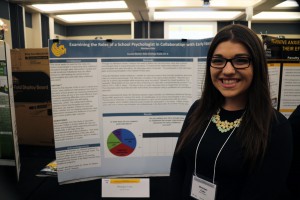
Research helps you define your professional interests and goals
“The research led to what I wanted to do. … As undergrads, a lot of people feel like they don’t know what they want to do, so joining the Honors in the Major program definitely helped me establish my passion,” says Monique Cohn of her project, “Examining the Roles of a School Psychologist in Collaboration with Early Educators.” Monique’s research identifies some of the challenges that school psychologists face and argues for resources that can aid them in their work.
Research helps you understand your place in the world
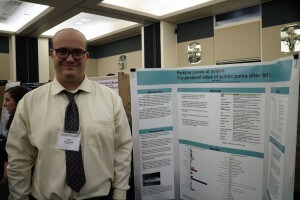
Ryan Hammond, a biology major, says that his research project, “Parks as Places of Solace: The Perceived Value of Public Parks after 9/11,” helped him understand how our everyday interactions with nature affect our lives. He hopes to share those insights with others: “No matter how mundane something you’re doing seems, think about why you’re doing it … It can be anything from ‘why do I have a lawn?’ to ‘why do I go to a park?’ because thinking about those things seriously can help you realize how you’re benefitting from them. … I’m hoping to explore how more mundane activities like going to parks affect our lives and the environment.”
Research helps you change the world
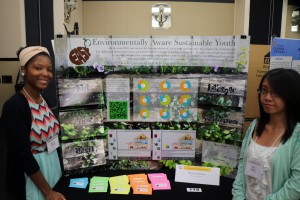
For Ronnetra Gibbons and Hieu Huynh a class project turned into a commitment to the environment and to community activism. Describing their interactive website, “Environmentally Aware Sustainable Youth,” which is designed to encourage Millennials to practice sustainable living, Gibbons says “This wasn’t just a class project to us, even though it started out that way—as just something we had to do to aim for an A. Within the project and through our research we found so much information and realized, ‘Wow, this is something that I can do and this is something that I can change.’ … We became more passionate about it as we progressed through the research.”
Experts offer some advice to future researchers
We also asked SURE participants if they had advice for students who might want to participate in undergraduate research and present their work. Here’s what they said:
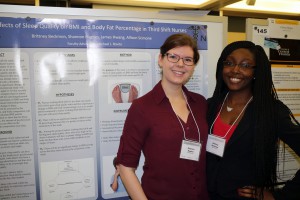
Shannon Hughes and Brittney Beckmon worked together on a project that explored the effects of quality of sleep on body mass index (BMI) and body fat percentage in nurses who work third shift. Beckmon says “Start your research early and do your research from the baseline. Don’t wait until the last minute!”
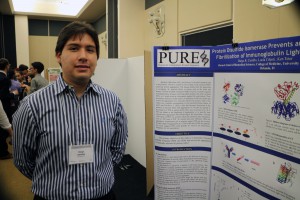
Diego Castillo, a student in the biomedical sciences who is researching a treatment for amyloidosis, a rare disease caused by protein build-up on the vital organs, had this to say: “Make sure you have a plan and also a good mentor because my mentor really helped me through this process.”
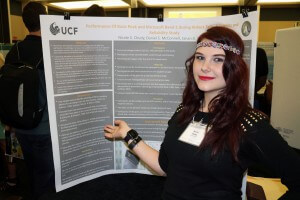
“I think it’s important to be broad in your explanation of your research, because not everyone understands these [technical] terms that we don’t learn in everyday life,” says Nicole Chudy, whose research is currently testing the viability of fitness-tracking devices as an alternative to electrocardiogram (ECG) equipment for tracking heart rate. She hopes her findings will help make physiological data more readily accessible in psychological research and treatment.
If you’re interested in undergraduate research but aren’t sure where to start, make an appointment or stop in to talk with a peer mentor. Visit the Office of Undergraduate Research. for posted advising hours.